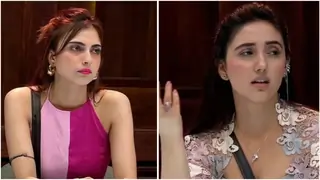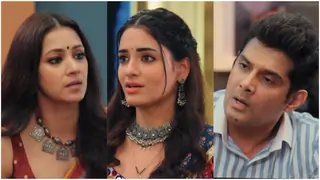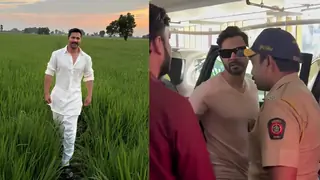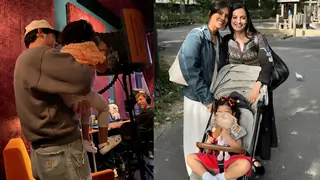Originally posted by: 420ad
Misti, I have been wanting to read your post for days but didn't get a chance...just read 'to the one who gave away'...your words have depicted Chaya's pain and dilemma so beautifully. In a way, I am glad CV's left Chaya's character to your imagination instead of destroying like they did with many other potential good characters..
I am not much into poetry but wanted to share some of my favorite poems by the German-born American poet, Lisel Mueller, though a little irrelevant to your thread. Hope you like it!-Ami.
When I am asked
how I began writing poems,
I talk about the indifference of nature.
It was soon after my mother died,
a brilliant June day,
everything blooming.
I sat on a gray stone bench
in a lovingly planted garden,
but the day lilies were as deaf
as the ears of drunken sleepers
and the roses curved inward.
Nothing was black or broken
and not a leaf fell
and the sun blared endless commercials for summer holidays.
I sat on a gray stone bench
ringed with the ingenue faces
of pink and white impatiens
and placed my grief
in the mouth of language,
the only thing that would grieve with me.
Curriculum Vitae
1992
1) I was born in a Free City, near the North Sea.
2) In the year of my birth, money was shredded into
confetti. A loaf of bread cost a million marks. Of
course I do not remember this.
3) Parents and grandparents hovered around me. The
world I lived in had a soft voice and no claws.
4) A cornucopia filled with treats took me into a building
with bells. A wide-bosomed teacher took me in.
5) At home the bookshelves connected heaven and earth.
6) On Sundays the city child waded through pinecones
and primrose marshes, a short train ride away.
7) My country was struck by history more deadly than
earthquakes or hurricanes.
8) My father was busy eluding the monsters. My mother
told me the walls had ears. I learned the burden of secrets.
9) I moved into the too bright days, the too dark nights
of adolescence.
10) Two parents, two daughters, we followed the sun
and the moon across the ocean. My grandparents stayed
behind in darkness.
11) In the new language everyone spoke too fast. Eventually
I caught up with them.
12) When I met you, the new language became the language
of love.
13) The death of the mother hurt the daughter into poetry.
The daughter became a mother of daughters.
14) Ordinary life: the plenty and thick of it. Knots tying
threads to everywhere. The past pushed away, the future left
unimagined for the sake of the glorious, difficult, passionate
present.
15) Years and years of this.
16) The children no longer children. An old man's pain, an
old man's loneliness.
17) And then my father too disappeared.
18) I tried to go home again. I stood at the door to my
childhood, but it was closed to the public.
19) One day, on a crowded elevator, everyone's face was younger
than mine.
20) So far, so good. The brilliant days and nights are
breathless in their hurry. We follow, you and I.
Why We Tell Stories
1
Because we used to have leaves
and on damp days
our muscles feel a tug,
painful now, from when roots
pulled us into the ground
and because our children believe
they can fly, an instinct retained
from when the bones in our arms
were shaped like zithers and broke
neatly under their feathers
and because before we had lungs
we knew how far it was to the bottom
as we floated open-eyed
like painted scarves through the scenery
of dreams, and because we awakened
and learned to speak
2
We sat by the fire in our caves,
and because we were poor, we made up a tale
about a treasure mountain
that would open only for us
and because we were always defeated,
we invented impossible riddles
only we could solve,
monsters only we could kill,
women who could love no one else
and because we had survived
sisters and brothers, daughters and sons,
we discovered bones that rose
from the dark earth and sang
as white birds in the trees
3
Because the story of our life
becomes our life
Because each of us tells
the same story
but tells it differently
and none of us tells it
the same way twice
Because grandmothers looking like spiders
want to enchant the children
and grandfathers need to convince us
what happened happened because of them
and though we listen only
haphazardly, with one ear,
we will begin our story
with the word and...
























